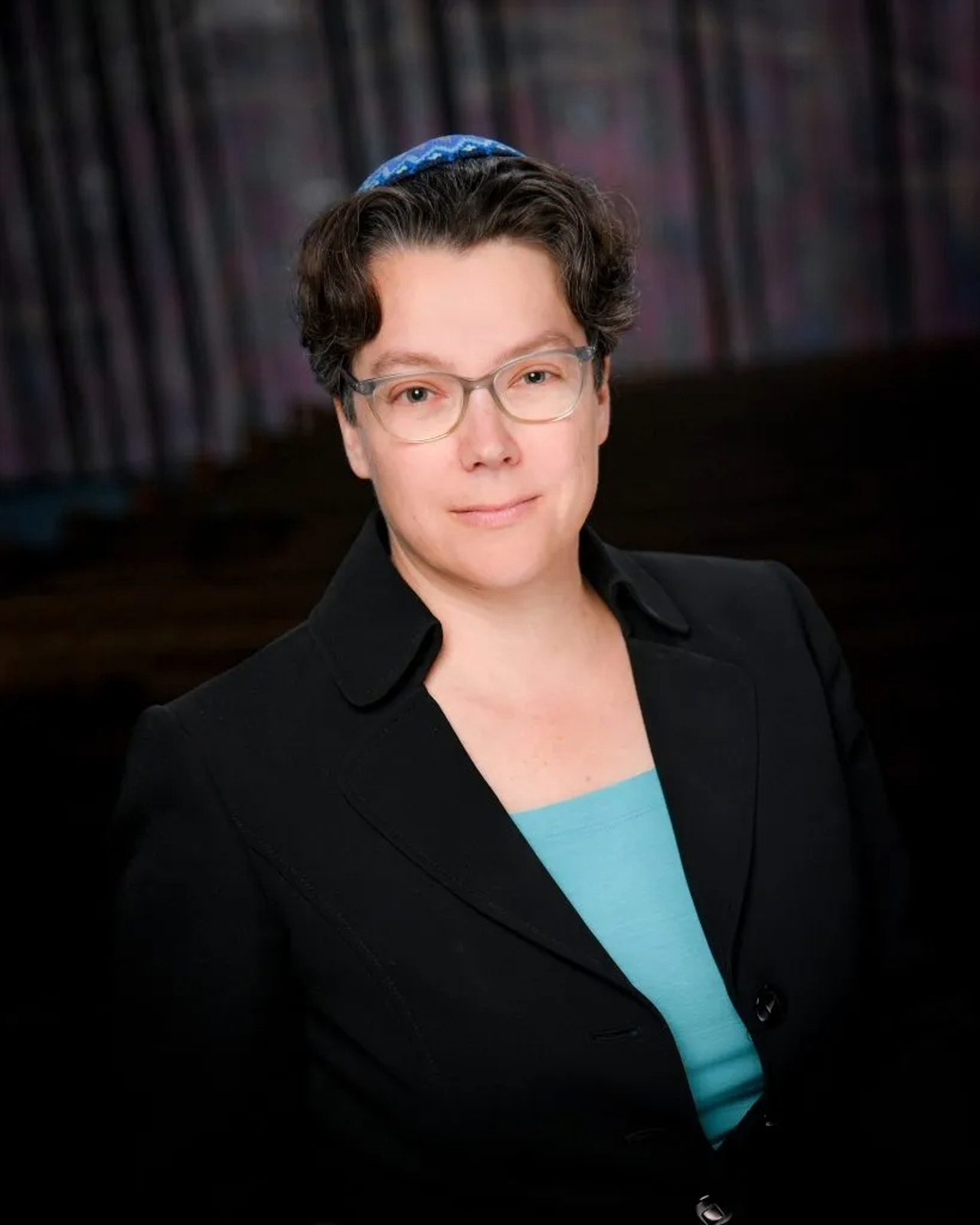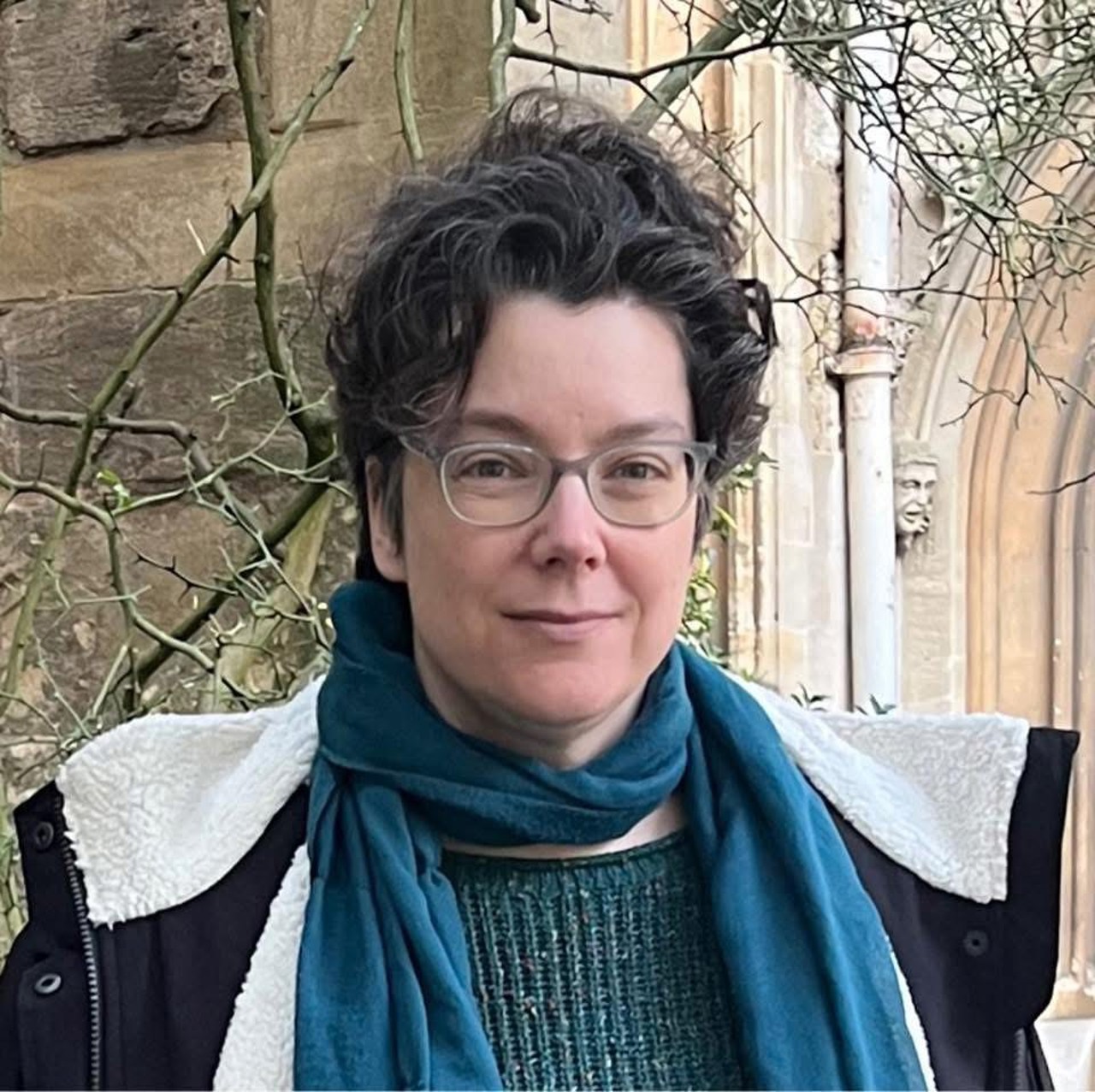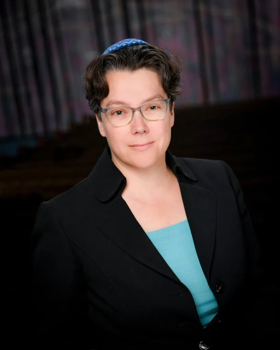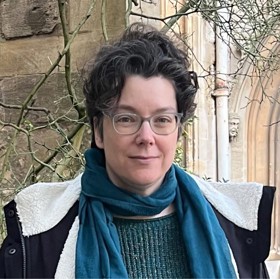Born in Ottawa in 1974, Lisa Grushcow studied at McGill University before going to Oxford to take an MPhil and then a DPhil in theology and religion. In 2003, she was ordained a rabbi at the Hebrew Union College – Jewish Institute of Religion in New York City. Grushcow then joined Congregation Rodeph Shalom in New York City and held the position of senior Associate Rabbi. In 2012, she assumed the role of Senior Rabbi at Temple Emanu-El-Beth Sholom in Montreal. Grushcow is the author of Writing the Wayward Wife: Rabbinic Interpretations of Sotah and editor of The Sacred Encounter: Jewish Perspectives on Sexuality. This narrative is excerpted from an interview with the Rhodes Trust on 16 August 2024.
Lisa Grushcow
Québec & Balliol 1996




‘We were very home-based, family-based’
I was born in Ottawa, and my family moved to Toronto when I was two. I grew up with all of my immediate family – my parents, grandparents and brother – and we were very home-based, very family-based. We were also always a big camping family, very outdoorsy and nature-focused, which is one of the great things about being in Canada. My dad was an entrepreneur, who had trained as an engineer. He worked in computers before that was really a thing. My mom worked in consulting and the healthcare area and was always involved in a lot of equity work, including early feminism and race relations. So, I would say that probably shaped me.
My brother and I are chronic overachievers, and we’ve both been lucky to find things that we’re passionate about. People often say, ‘Oh, do you come from a rabbinic family?’ and the answer is ‘No.’ In fact, I come from a long line of engineers. And one of the things I hold onto from my grandfather of blessed memory, who was an engineer, is that there is no problem without a solution. I feel like that’s not always the case, but it’s often enough the case that it’s a good mindset to have.
On applying for the Rhodes Scholarship
At McGill, I majored in political science and minored in Jewish studies. For me, my undergraduate degree was a time of finding chosen family and figuring out what mattered. I had a really formative group of friends, and we would meet for Shabbat dinners every Friday night. But for a lot of us, it was our first time owning our own traditions and being creative about them and creating our own communities and all that good stuff. I also ended up as VP of University Affairs, which was basically bridging between the students and the administration, and we worked across a lot of areas including a sexual harassment policy and a policy to help people with their observance of religious holidays.
I’d known for a long time about the Rhodes Scholarship, and I was a bit of an Anglophile in terms of romanticising Oxford and British education, the dreaming spires and all that. I knew I had the extracurriculars and the academics but it was still an act of chutzpah on my part to apply. I’d actually applied and been accepted to the Jewish Theological Seminary, in the Conservative movement of Judaism, which at that time didn’t ordain folks who were gay and lesbian. I was not out to myself at that point, but on some level, I knew I needed some time to get some distance, figure myself out and figure out what life was going to look like.
‘It was an important time for me spiritually’
I put down my choice of course at Oxford on a whim, because I did not imagine I was actually going to get the Rhodes Scholarship. I joke that I was in the MPhil with the longest title – Judaism and Christianity in the Greco-Roman World – and the fewest people, because there were only two of us. The other student was an evangelical Protestant from Australia, so we came from really different backgrounds and assumptions, but it was a great opportunity to do some bridging. I had been raised in a fairly insular Jewish environment in some ways, and the programme definitely exposed me to religious difference in a way I hadn’t experienced before. I’d never picked up a Christian Bible before, for example. That had always felt vaguely taboo.
When I was studying in Oxford, I got invited to take part in Jewish Christian Muslim trilogue in Bendorf, Germany. Academically, bar none, it was the best experience I’d ever had. The tutorial system at Oxford doesn’t pat you on the back. It’s about what you don’t know and what you can know. At first, that was really disorienting. But it taught me to develop a sense of the value of my own work. What I also loved about Oxford in terms of the academic structure was that people don’t care so much or ask so much about your personal life and path and all that stuff we love to talk about more in North America. That just gave me the space, in a way that was really helpful, to be able to think through different things, and I’m so grateful for that.
It was while I was at Oxford that I figured out who I was a little more. I had a great community of people there, but coming out wasn’t easy. It was very raw and challenging. I reached a point where I had a choice between following a path to being a rabbi, where not only gender but also sexuality would be an issue, or doing just about anything else. I was further from organised religion than I’d felt before, but it was an important time for me spiritually, thinking deeply and reading and talking to people from all different walks of life. I think if you’re going to be a leader, you need to do that with some amount of integrity and honesty, and it felt pretty clear to me that I couldn’t follow the path I had chosen in a closeted way.
‘I really had the chance to roll my sleeves up’
I learned so much during my time as an associate rabbi in New York City, especially from my senior rabbi. He had a strong relationship with the neighbouring black church and was really involved in Planned Parenthood and religious leaders working on reproductive rights. I was involved in some of that interfaith and values-based work too, for marriage equality, and also the DREAM Act, advocating for children of immigrants.
When I came to Montreal, I really had the chance to roll my sleeves up and do much more of that kind of work myself. What I love about this congregation, and what’s also really challenging about it, is that it’s the only Reform synagogue in Montreal and really in all of Québec and eastern Canada. People come here from all over, looking for a more progressive type of Judaism, where interfaith families are welcomed, where queer families are welcomed, where there’s absolute equality and care about social justice. Because I had come from New York, where it’s not novel to be a woman and a rabbi, where it’s not novel to be gay and in a synagogue, I felt I had the background and the confidence to say, ‘Yes, these are all the things I can bring, but it’s not about me. I’m here to be a rabbi to everyone.’
For all that, this has been a really testing time for bridge-building, given everything that’s happened in Israel and Gaza. A lot of communities are hurting. We’re seeing a rise in antisemitism, which is really sobering. And at a time when I think people are taking refuge and comfort in having things be really black and white, we’re a place of grey. We’re a place that tries to hear different voices and different stories, even when they’re challenging and painful. It’s a hard time to do that. Doing that is very much a balancing act. My hopes are that we can keep building this community and strengthening it, so that it can continue to be a home to people who are on all kinds of different journeys with all kinds of different stories. We can only do our best.
‘It’s phenomenal the way the legacy has been redefined and reimagined’
One of the things I’ve been thinking about a lot is that campuses ought to be places where we can have conversations. I think it’s possible to have safe space which is also uncomfortable space, and where we grow the muscles to be able to have tough conversations. It’s sad to see that not happening in a lot of ways, but I try to hold on to the fact that it is possible.
The Rhodes community is already becoming a place that fosters intentional conversations across difference, and my hope would be for more of that. It’s ironic, because we know it started as such a specific, white male English/American vision of what leadership looked like and what the world looked like, and I think it’s phenomenal the way the legacy has been redefined and reimagined. I would love to see more shared opportunities alongside the individual opportunity that the Scholarship gives people, so that when something is going on in the world, we can use our networks to learn from one another. As Rhodes Scholars, we know that people have invested in us, and we want to give back.
